“Pray for us, sinners now, and at the hour of our death” – Walsingham.
This is perhaps the most two-sided day of the journey so far, containing elements of dreadful and wonderful in an exhausting yet bizarrely life-affirming drama.
I awake early in a large playing field, and after putting away my tent, sneak away and devour a breakfast of currants. It’s a sunny and pleasant day, and I book ahead a youth hostel bed in faraway Hunstanton, in order to avoid the following night’s predicted rain. From the kid’s centre I pedal up to Norwich via Hethersett, along a deserted A-road and then threading through some suburban back-ends, before spotting a Tesco Express. These stores are now omnipresent where ten years ago they were relatively unknown. Everything here is probably more expensive than a local independent store, yet there’s something irritatingly comforting about the place. It’s the McDonalds effect, the comfort of knowing what to expect. I buy some water and the materials of my lunch and dinner for the day.
As I arrive into Norwich’s centre, the town seems fine enough, fairly big and surrounded by the usual ring roads, and some slightly grand suburban houses preceding these. As I pass nearer, I see the typical chain stores all fully represented, confirming that in the modern British Town Centre the only permitted activity is shopping.
But when arriving in any new city, first look up. Tall buildings represent power, and in any town that has protected its traditions, these will often be either religious or military structures – the old cathedral, the ancient keep. In London over the last decade there has been a notable rise in bland and poorly-designed skyscrapers clearly hostile to the landscape and surrounding communities. They may be acts of commercial hubris, but they too express the ambitions and domination of investment capitalists. Is it really so strange to consider the Shard or Gherkin being listed, relics to the hubris of the financial capital era?
I’m in good spirits anyway, and I pedal on to the castle looming in the skyline.
It’s a large cube-shaped structure and looks modern, of an unusual whitish hue brick that’s also used in the town’s cathedral. The area around it is largely empty, and curious, I venture further. The castle was built by the Normans in 1067 to control the subjugated local Saxons. Soon after, the local earl Ralph de Guader led a rebellion against his Norman rulers in 1075 from the castle. After Ralph flees, his brave wife keeps up the fight within the besieged castle for three months.
I pass round beneath its battlements and look out at the town skyline, large and sleepy, with the football ground and cathedral in the distance. I move onto there, and find it also has an intriguing back-story. A Norman church built around 1096, it is marked by its tall spire and plain whitish exterior. No gargoyles here. In 1272 there’s a riot between Norwich citizens and monks, which leads to the cathedral cloister being burnt down. This is a rebellious place! Even its bishop, Henry Despenser, acted as a military leader during the Peasants revolt of 1381. As I pass drunks and passed-out joggers tended by paramedics, I wonder if the priory had a fight academy attached?
But I’m not here for these things, nor the mustard or the national yeast academy, other quaint things of Norwich, but to see the town that was home to one of my favourite English writers, Thomas Browne. Though born in London in 1605, Browne settled in Norwich in 1637 and practised medicine. In his spare time, he collected books and speculated on philosophical matters. He writes one book dispelling ‘common sense’ errors, something we need for our own time. But my favourite book of his is Urne-buriall, a reflective and wonderfully-composed meditation on death in 1658. (I have to thank my teacher Ariel Hessayon for introducing me to this still-unknown masterpiece, and to the set of philosophers that I now research in and occasionally teach today). His thoughts are prompted by the discovery of some anonymous Bronze Age urns discovered nearby, leading him to reflect on the transience of all things.
Consider this:
“There is no antidote against the Opium of time, which temporally considereth all things; Our Fathers finde their graves in our short memories, and sadly tell us how we may be buried in our Survivors. Grave-stones tell truth scarce fourty years: Generations passe while some trees stand, and old Families last not three Oaks”.
Browne dies in Norwich but I don’t find any sign of his existence today. What intrigues me about him is that he combines his somewhat unorthodox Christian faith (his mystical yet frank spiritual self-portrait The Religion of a Physician was placed on the Catholic Index) with a largely non-Christian set of classic texts from ancient Greece and Rome, as many did during the Renaissance. Like Michel de Montaigne, another excellent writer, he uses the beliefs of ancient times to shed light on the present.
To my mind, the possibilities of considering the world, one’s self, and the afterlife, through these sets of non-Christian texts gradually made it possible for societies to shed the burdens of an oppressive and authoritarian religion, first in the Reformation, and later in the 18th century revolutions that lead to modern secular democracies. Aristotle, Cicero, Seneca and others, the ‘classics’, conceal at times dangerous visions for democratic or rational societies so distant during these eras. Great moments of mass rebellions were often inspired by unorthodox forms of Christianity, from austere Puritanism to the growth of Methodism in impoverished industrial and fishing communities, creating communal coherences and a belief in the welfare of the poor that lent itself largely to trade union activism in the 19th century. The importance of these congregations to forming a kind of collective identity is totally overlooked in modern left-wing political histories, yet it seems glaringly if inconveniently obvious.
I follow a cycle route out of the town which takes me onto the pretty and easy-going Marriot’s Way, built over a former train line that ran through the area until 1971. As a commuter line one can see the issue: it seems to pass no major settlement! I pedal on through the pretty countryside around me, flanked by hikers and families on bikes, all admiring the bluebells, cowparsley, poppies and other wildflowers that appear all around us, butterflies mating, songbirds catching bugs, rich farmland all around us, life blossoming in every place.
The ride is bumpy but enjoyable. I feel much lighter as I pass along the path, and after a couple of hours I make it to Reepham, where I cycle round to Foxley Wood. It’s a wonderful place. Seemingly deserted of anyone, it’s Norfolk’s largest remaining ancient woodland. I wander in and find a path between thick grass, immersed in the scale and diversity of the trees, lush verdant colours and delightful scents. I choose to celebrate with a Kitkat, when I suddenly notice something truly disturbing.
At the back of the bike, only one pannier is attached. The other, carrying my laptop, phone charger, notebooks and all else has vanished. Shit.
So like me, one might think ‘Ok, it must have fallen back recently, that’s logical, I wouldn’t have missed that’. So off I search. I first head back to Reepham, where I bump into a family of cyclists. They’ve spotted my plastic pannier holder on the path nearby, but no bag. My heartbeat doubles. I continue further, desperation continuing. After a mile, I spot a passing cyclist in blue and old tattoos. Yes, he saw it about 7 miles ago at a car-park near Norwich. I get as much information as I can from him and continue, terror spreading across my body.
For the next hour and a half, I cycle back the way I came in a state of pure anxiety, asking everyone I pass if they’ve seen the bag. Answers are universally negative. I call local cafes, try every option, but to no avail. The cyclist’s advice is incorrect, the road he mentions seeing it on isn’t even on the path I came up. Another thinks she saw me with it some miles back in a place I’d already back-tracked by. Neither holder nor bag is anywhere. What can I do, but keep on, following the path dismally, hoping that some miracle will cause it to appear.
I am approaching Norwich again when I start lurking around a car-park, hoping someone might’ve left it there. Out of the blue, from what looks like an unoccupied car, a man calls my attention. ‘Something’s trailing off your bike’, he says, referring to the haphazard way I’ve attached my rebellious sleeping-bag. I ask him if he’s seen a black bag. I can’t remember his exact words, but he guides me towards his car, and lo, it is there! Russell had waited two hours in his car since picking up the bag with his wife. They were about to leave at 3pm when I appear. He wanted no reward for his goodwill and patience, and has truly saved this project, and saved me from some serious expense. He would’ve handed it into a local police station, a place I wouldn’t even have thought to check, but there was no ID in my bag.
Thank you Russell!
From despair to dizziness then. The sun is baking hot and in a strange twist, cuts appear across my hands and start to bleed. I get the bag back on with the aid of some bloody bungee ropes, and thank the heavens for their kindness.
All this gets me wondering about my attitudes. If I saw an abandoned rucksack or bag, would I wait a couple of hours in the very place it was lost in case the owner returned? Would you?
I probably wouldn’t. I think I would ignore the bag, or perhaps put it on the side, where some enterprising passer-by might make new use of it. But their kind conduct has truly saved me. So, shouldn’t I do that in future? Or more precisely, shouldn’t I do whatever I can to put the welfare of others as equal to my own?
This isn’t an unreasonable expectation, yet I can’t say when I last really thought that. It’s a mental challenge. When I return home, I want to find ways to be more like that, a good Samaritan, not just immersed in transient projects of one kind of another. I think that the frequency of expressing goodwill, friendliness and kindness to others, often unsolicited, can help enhance one’s mood. I choose to test it, greeting everybody I pass. I’d never do it in London. But I feel wonderful, and in my exchanges, people’s faces transform from scowls to smiles. It seems to work.
The sun is now baking hot. I feel like I am being rotated around on a hot microwave dish, and I have lost two hours on my journey to Hunstanton. Emotionally I’m wrecked. But I’ve a room booked, and in my heart I feel grateful and vulnerable, reminded that my enjoyment of life can quickly be overturned beyond my power. I ride on, sticking with my original journey. It takes me an hour to get back to Foxley Wood, this time taking A-roads, and from there I cycle up what feels like a mountain and a year to get to Our Lady of Walsingham shrine.
Like many holy shrines, look beneath the surface and the miraculous grounds seem spurious. In 1061 a devout noblewoman, Richeldis de Faverches, had a dream where Mary showed her the birthplace of Jesus in Nazareth, then instructed her to build a replica in Walsingham. That’s all. We’ve all had strange dreams, though often not the resources or supportive popular culture to make them realities. But it became a major place of medieval pilgrimage thereafter, known as ‘England’s Nazareth’, and popular to those too ill or poor to afford the dangerous journey to the Holy Land. During the Reformation, when Henry VIII oversaw the dissolution and destruction of monasteries and holy sites across the country, the famous statue of our Lady was taken to London and burned, an act of extreme symbolic violence.
It staggers me. The more stories I discover as I travel, the more it occurs to me how turbulent and chaotic every era has been. Catholicism was eventually banned, and practise secret until their ‘emancipation’ in 1829. Despite the back-story, it is a peaceful place, remote from the nearby town or else, showing little evidence that the 16th century has arrived. It is surrounded by rolling hedgerows and flooded groves where children play in the water.
The journey has sapped all my reserves, and the trip up brings me a bit closer to the distressed yet rapturous mind-set of a pilgrim 700 years ago. When I arrive, I wander round into the grounds, into the small chapel rebuilt in 1897. Something strange comes over me. I wander into the chapel of our Lady, deserted, and choose for the first time since, perhaps when I was 14, to make a prayer.
At my Catholic state school near Streatham, each class began with the Lord’s Prayer. It was taken for granted that you were a zealous observer, and I largely followed these rites without much thought, believing faithfully for a little time, around 13 or 14, before being persuaded by my reading to cease mumbling those old words and carry the courage of my convictions. Fides intrepida became faith in oneself. I lost faith in a religion that had no problem with auto-da-fés, holy crusades, systematic child abuse and the selling of pardons in the afterlife, just as many others have done.
Falling to my knees, I pray for the health and wellbeing of my loved ones who I miss dearly, my friends at home, and the friends I have met so far on the road. The room is small and dark, crammed with candles that emit a great warmth and unearthly rattling noise, a little like sitting on a stationary train in a tunnel. Maybe it’s the exhaustion, but there’s a deeply powerful feeling in prostrating oneself before a god, before an idea or sense of spirit beyond oneself. I feel hope welling up within as I finish my prayer, unburdened of my exhaustion and optimistic that the hand of fate will steer my loved ones to happier paths.
All illusions, wonderful illusions. As I light a votive candle and pay my due, I’m reminded that these illusions give strength to me as they have done for so many pilgrims of whatever faith, at whatever place. Gods answer the prayers of humankind as often they do a songbird or a stone. The veracity of its external reality isn’t what’s at stake, but the possibility of finding courage and hope in times of suffering. For this, we atheists have found little way to meet the emotional needs for redemption, hope and self-sacrifice.
Roman Catholicism was such an essential glue of English societies, linking together disparate communities of Britons and Angles, Saxons and Jutes, and later Danes, and Normans, in a shared worldview and system of beliefs. Monasteries became places where it was possible to manually produce books and histories that we depend on today. Though no doubt variants of paganism before probably offered similar experiences of hope and redemption, this form of Christianty, and later variants of Protestantism afterwards, all offered this to centuries of peoples living on these isles.
And yet, did people even understand the services? Gerald of Wales once travelled through Wales with the Archbishop of Canterbury under the command to recruit people for the First Crusade. He describes addressing a congregation at St. David’s in Latin and French, where he is able to persuade a great crowd of lads to join the volunteers. But disaster strikes when an enthusiastic local translates his address into their native Welsh. Suddenly they all change their minds! They hadn’t understood what was said in the first place, just the power of the robes and mystical-sounding words.
Though I plan to discuss all the other religions that have thrived here, Christianity will necessarily deserve the largest place. Curiously, the landscape of Norfolk is the best place to explore it. Here there are more medieval churches concentrated in the area than anywhere else in Europe.
I pull myself together and swallow up a large bag of raisins and nuts, proving enough energy I hope for the ride to Wells-on-the-sea. My phone is out of battery and I’m now bound to relying on chance and the occasional road sign. I leave and cycle up to Little Walsingham, a pretty little town with fluttering flags and old hospices. I pass a large group of cardinals and bishops waving pints of beer outside the Bull Inn, laughing away in the sun. It’s an inexplicable place. I find ‘Wells Road’, a safe bet, and follow it up, passing pretty hedgerows, finding my strength.
This journey has so far been the most gruelling yet life-affirming experience I’ve had, aside from getting married. It is an experience of peeling away the mind’s old layers, hardened and dirty like the skin of an onion, opening up oneself to new images and ideas. I strongly recommend it to anyone seeking a tonic for the mind.
I reach pretty Wells, a harbour town passed over to the purposes of tourism on the northern coast of Norfolk. The weather is cold but the harbour is full of families, many picking crabs with nets. I ask one family what they plan to do with them. They laugh, and say they’re not for eating. The buckets are full of a kind of transparent prawn too which no-one nearby can name. There’s great fun here, and I gaze out at the jutting boats next to a fisherman, dizzy and elated. My body is so tired that it feels like a separate piece of heavy costume or armour, encasing a light and ecstatic mind.
I move on, wandering through poky streets and shops, quietly absorbing the landscape. It’s a lovely place. In a past life, I imagine being here with my dad and brother and sister, arguing over control of the crabbing net, asking for money to play the arcade games, chewing fish and chips beneath lurking gulls. Or perhaps later, with my partner there too, sitting back in a warm holiday cottage, exchanging opinions on the local beer with an acquaintance in front of a game of draughts. All wonderful illusions.
I wander up to the beach and take in the sunset, before finding a road which I bet will take me to Hunstanton, a longish road of 16 miles. It’s now evening and I’m very tired, but I’ve accommodation booked, so off I go.
The route is wonderful. No map seems to recommend it, but it takes me right by Scolt Head marshes and many of the protected lands on the north Norfolk coast where rare birds and plants can flourish. Birds continue to fly overhead, temporarily casting shadows over the full sunset. I pass few houses for the most of it and look up at the sky. My brain must be overheated, as I see dark lines of waves emanating across the sunset.
I pass through several small towns called Burnham-something, and then through pretty Brancaster, occasionally glimpsing views of the turbulent sea to my right. This part of the world has a deep relation to the sea, full of stories of wrecks and murderous smugglers, birthplace of Horatio Nelson and George Vancouver. It has deceptively gentle scenery: largely deserted, surrounded by hedgerows, both of which are fairly recent inventions.
Between 1780 and 1830, the local population doubled, whilst food and job production did not. Small farmers were thrown off the common lands as they became enclosed by wealthy landowners, many of whose families still ‘own’ the land today. This is reflected in those tranquil hedgerows commonly lauded as particularly English. On the whole, they are a recent device created during the enclosures to mark off common land into property. They may be a haven for birds, but they are not ancient nor English, but a yoke of ownership, a sign of popular expulsion. Stick that in your pipe, Bill Bryson.
Nelson appealed to the local Earl of Clarence to raise the wage of labourers from tuppence a day. “They are really in want of everything to make life comfortable”, he wrote in 1792, and could drink “nothing but water”. The letter is ignored, like any polite plea to business leaders over zero-hour contracts, food banks, or any other modern insecurity is today. What has history shown of letters and petitions?
Land enclosure turned small farmers into causal labourers, whilst technologies like the threshing machine threw many farmers out of work over winter, causing real destitution in this cold and bleak countryside. Without food or shelter, in conditions of poverty worse than a modern refugee camp, in north Norfolk less than 200 years ago. Labourers and their families who had lived in a parish for less than a year, common wherever they’d been newly displaced from the common land, were also ineligible for welfare assistance. Combine this with bad harvests, inflated Corn Law prices turning bread into an expensive commodity, and a huge swelling of the unemployed by returning soldiers from the Napoleonic wars and, by 1830, north Norfolk was full of rioting and unrest. The army are called in, and eventually it dies down, as the countryside depopulates on a huge scale. Families migrate into cities and become sucked into factories, working over ten hours a day for the glory of the empire’s trade.
Today these pretty hedgerows and sleepy villages are dominated by holiday cottages and expensive second homes. I’m told of a condition in place that only allows purchase of properties if one has lived in the area for over three years in an effort to retain some local identity. It’s a good idea, and I wonder if Aldeburgh or Southwold might take it on board. I meet a local woman who says she could not afford to buy in her home of Southwold. It all reminds me of the desperate issue of housing in contemporary Britain. Since Thatcher and successive governments, our infrastructure, housing, public institutions, even quality of diets are all turning back to the mid-19th century. Overcrowding and preventable deaths. What is to be done?
I pass through pretty old Hunstanton and at last make it into the new town. The sun is now about to set. A man taking a photo by his car agrees that it truly extraordinary. I find the youth hostel, and after a quick wash, two bottles of local beer and five fajitas, am deeply relieved to be here. As I begin to type up these reveries indoor, great torrents of rain begin to fall.



















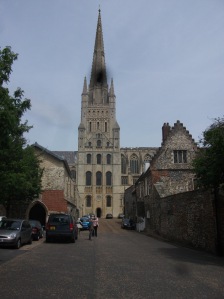





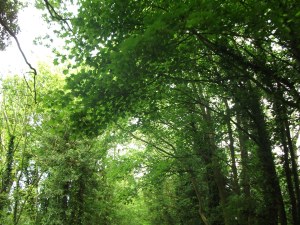












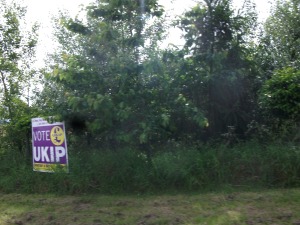




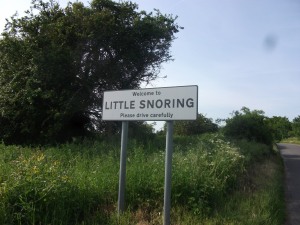

















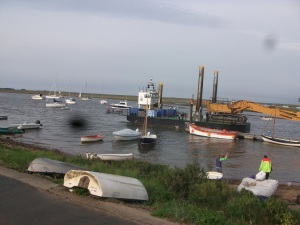



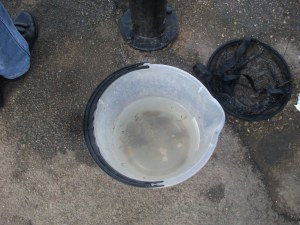



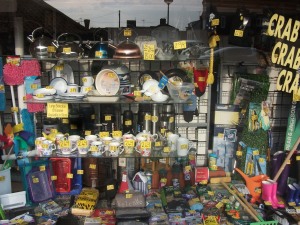






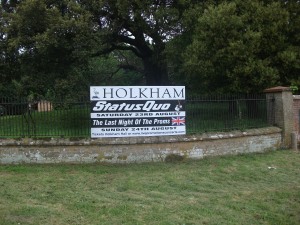






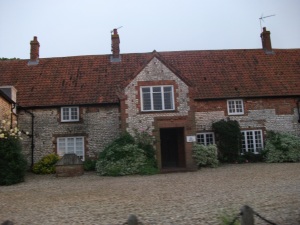


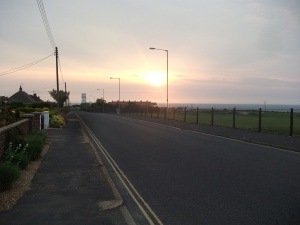



I almost had a heartattack reading the bit about when you lost your laptop!
Also have you tried blowing on the camera lens to get the dust out?
Lucy x
I almost had an anxiety attack when you described the bit about losing your bag!!
What a weird coincidence! I am from Norwich, but live abroad at the moment, and was actually visiting my sister in Wymondham when you passed through!! Has made me very homesick!! Really enjoying the theme of your journey though, will be following!!